You keep your sexy Donald Trump.
This year, the cool kids are going as sexy Nicolás Maduro.
Just don’t throw mangoes at me.
Since the initial June parliamentary elections in Turkey, the country has weathered more instability than at any other period since the Islamist Adalet ve Kalkınma Partisi (AKP, the Justice and Development Party) came to power.![]()
On the eve of fresh elections this weekend, consider all that’s happened since the June elections when the AKP lost its parliamentary majority:
In the June elections, the AKP won just 256 seats in the Türkiye Büyük Millet Meclisi (Grand National Assembly), 20 short of a majority. It was the first time since the AKP first came to power in the 2002 elections that it failed to win a majority, scuttling Recep Tayyip Erdoğan’s to consolidate power in the Turkish presidency after won Turkey’s first-ever direct election to the mostly ceremonial office last summer.
The AKP fell so low because, for the first time in Turkish history, a pro-Kurdish party, the leftist Halkların Demokratik Partisi (HDP, People’s Democratic Party), ran for election on a unified list and won enough support to meet the 10% electoral hurdle for winning seats in the National Assembly. With the HDP taking 80 seats, it made it that much more difficult for the AKP to reach an absolute majority. Continue reading A deadlocked assembly could mean a third election in Turkey
Though it was the most competitive presidential election in the history of democratic Tanzania, the ruling party candidate, public works minister John Magufuli easily won the election last Sunday in results announced earlier today by Tanzania’s elections commission.![]()
![]()
Magufuli emerged as a dark-horse candidate of the ruling Chama Cha Mapinduzi (CCM, Party of the Revolution) after a contentious fight left former prime minister Edward Lowassa and foreign minister Bernard Membe (the favorite of outgoing president Jakaya Kikwete) both precluded from contention.
Earlier this summer, the spurned Lowassa decided instead to depart for the opposition camp, becoming the presidential challenger for a coalition that includes Chama Cha Demokrasia na Maendeleo (popularly known simply as Chadema), a liberal opposition party formed in 1992.
Tanzania’s electoral commission announced that Magufuli won 58.46% of the vote while Lowassa won just 39.97%. The CCF is also expected to win a majority of the 357 seats in Tanzania’s Bunge, the unicameral parliament.
* * * * *
RELATED: Genuinely competitive election boosts Tanzanian democracy
* * * * *
Lowassa, who served as Kikwete’s prime minister from 2005 to 2008, left office in scandal and mired under allegations of corruption. While his political power and support base made him the most potent possible challenger for Chadema, it also tarred the previously anti-corruption opposition party. No longer would Chadema necessarily be the party of change nor would it be the party of transparency and good government, and its 2010 presidential candidate Wilbrod Slaa left the party and endorsed Magufuli.
Magufuli, age 55, swatted away criticisms of old age and ill health, at one point doing push-ups on the campaign trail to demonstrate his vigor. The showdown between him and Lowassa was among the most contested election campaigns in the country’s history, with both candidates vying for an electorate that’s one of the world’s youngest — 50% of the population is between the ages of 18 and 32.
But as easily as the national elections seem to have gone throughout the Tanzanian mainland, the islands of largely autonomous Zanzibar have been far more problematic. Continue reading Zanzibar election nullified as Magufuli easily wins Tanzanian presidency

Faced with a deep economic slowdown for the first time since the 1970s, the headline news emerging today from the Chinese Communist Party (中国共产党) at its fifth plenum this week is that it will formally end its one-child policy as the country deals with the more pressing problem of a rapidly aging population.![]()
The meeting, where the Communist Party will design its 13th five-year program for the Chinese economy, is an important moment for ruling officials to chart the path that Chinese president Xi Jinping (习近平) will carry forward through the end of his first term and a second term to which Xi will presumably be selected in 2017.
Though the Chinese government has been relaxing the terms of the one-child policy for years, today’s step formally ends a policy first enacted in 1978 at a time when China’s economy and demographics were far different than today. In the wake of the post-Mao era, Chinese Communist officials worried that exponential population growth would worsen environmental problems that were becoming apparent four decades ago, spread too thinly resources for educating a new generation of Chinese children and keep the country mired in poverty.
* * * * *
RELATED: China’s stock market crash is a political, not economic, crisis
* * * * *
After introducing the one-child policy, China turned to the neighborhood associations that Mao Zedong created throughout the country to enforce the new family planning edict. Almost overnight, local party infrastructure became an essentially intrusive mechanism to keep Chinese families in line and restrict reproductive freedom in the name of collective development. Parents who violated the policy faced monetary fines and, in some cases, forced abortions or even forced abductions of their second child. Throughout China, second children essentially became pariahs, and they faced restrictions on government-funded health care and education.
Farmers in parts of rural China were exempted from the policy, especially when their first child was a daughter. Moreover, ethnic minorities (even in urban areas) were exempt from the policy as well. In 2013, China relaxed the policy even further by allowing parents to have two children so long as both parents themselves were only children. That exemption largely ended the policy, meaning that today’s decision to end the one-child policy is more a formality than a real change. In an era where Xi has cracked down on political dissent and Internet freedom and arguably launched a widespread crackdown on corruption to purge rivals within the ruling Party apparatus, today’s decision is a rare extension of Chinese freedoms.
Gauged by the worries of policymakers in the 1970s, the one-child policy has been a slight success. That’s at least insofar as parents and grandparents dote on a country full of only children, deploying each family’s resources on the educational and developmental progress of a single child. But it’s the country’s breakneck growth, not family planning, that played a far greater role in lifting China out of poverty. Four decades of economic liberalization and international trade, which began under Deng Xiaoping in the early 1980s, is responsible for that. It helped that China didn’t face the kind of turmoil that roiled it during World War II and the civil wars of the 1940s, the rural famine that marked Mao’s ‘Great Leap Forward’ of the 1950s or the political terror of the Cultural Revolution of the 1960s and 1970s.
Moreover, what’s become increasingly clear in retrospect is that the one-child policy may have accomplished far more harm than good by accelerating the aging of China’s population and by facilitating a highly imbalanced sex ratio of boys to girls.
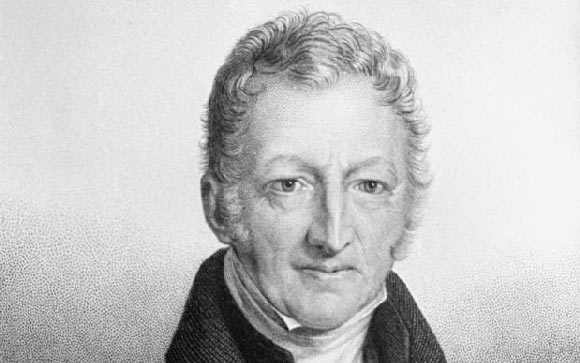
The intellectual roots of the one-child policy lie partially in the problematic economic ideas of Thomas Malthus, who argued at the end of the 18th century that rapid population growth would be invariably met with disease, starvation and war. If left unchecked, a doubling of the population would burden the ability of a country’s land to generate enough food to support a demographic explosion. But the human experience over the ensuing two centuries has been exactly the opposite as innovations in agriculture have produced far more food with increasingly less labor. In the year 1800, global population is estimated to have been around one billion; today, it’s 7.4 billion and growing at a time when global poverty is in decline.
Moreover, by the time that China’s policymakers got around to introducing the one-child policy, China’s fertility rate was already rapidly declining, matching global trends in both the developing and the developed world, partially as a result of the widespread availability of medical birth control. The one-child policy, estimated to have prevented between 250 million and 500 million births, had the effect of pushing China’s birthrate away from that of a developing closer to one much more characteristic of a developed country. But as the chart below shows, as based on UN data, China’s birthrate had already slowed long before the one-child policy took hold.
(Nielsen)
Had China done nothing, fertility rates would have naturally continued to decline — and all without expending the costly efforts to restrict freedom in such an intimate and fundamental way.
For all the costs of enforcing the most restrictive family planning in world history, China doesn’t have much to show as a result.
China’s median age (today) is 36.7 — that’s akin to Iceland and just slightly younger than the United States (37.6), Australia (38.3) and Russia (38.9). The United Nations estimates that by 2025, China’s median age will be essentially the same as the US median age and, thereafter, China’s median age will be ever older.
As its neighbors South Korea (40.2) and Japan (46.1) have aged, however, economic growth has slowed. That might be fine for South Korea and Japan, because they now both enjoy income levels roughly equivalent to developed countries. China, though it’s well on its way to becoming the world’s largest economy, has only just reached middle-income status. So the one-child policy might have put China on a slightly less fertile trajectory — but only slightly.
With economic uncertainty looming, it seems likely that the era of residual double-digit GDP growth in China is coming to an end. So while China has ‘caught up’ on aging, it hasn’t quite caught up on income levels and per-capita GDP. Even when China transcends its current economic gloom (and it will), it will be more difficult for it to play catch-up with an aging population and fewer working-age people in the labor market. Moreover, the low-hanging fruit of the past three decades — building the infrastructure (hospitals, bridges, schools, entire towns and cities) for a rapidly modernizing country — will be increasingly out of reach for economic planners.
Exacerbating China’s demographic woes is one of the world’s most lopsided sex ratios — only 100 women for every 112 men. There are a lot of reasons for that, including a sex ratio that tilts naturally at around 1.01 in favor of males. But given traditional cultural preferences for males, more Chinese families have opted to ensure that the single child permitted to them is male and not female. In a country of 1.38 billion people, that means that tens of millions of Chinese men have had and, for the foreseeable future will have, only negligible chances for marriage or starting their own families. At a time when economic misery is rising in China, that’s not particularly good news for ruling Party officials who could struggle to contain political and social anger in the event of a prolonged economic slump.

When Daniel Scioli emerged on Sunday night to declare victory in the first round of Argentina’s presidential election, it was clear that he did not expect to win the presidency outright and that he would face a runoff — even though no official election results were yet announced.![]()
When the first results finally came at around 11 p.m., they showed a far closer race than anyone predicted. At one point, Scioli’s rival, outgoing Buenos Aires mayor Mauricio Macri, was actually leading Scioli. Ultimately, Scioli narrowly won the presidential election’s first round, but Macri’s support was so unexpectedly strong that he now enters the presidential runoff campaign as the odds-on favorite to end 12 consecutive years of kirchnersimo.
At stake in the presidential showdown is the legacy of one of the most important bastions of Latin America’s populist, statist left.
Macri, the candidate of the center-right Cambiemos (Spanish for ‘Let’s change’) coalition, has gradually expanded a political movement that was once limited to just the most affluent corners of Argentina’s capital. The son of an Italian immigrant, Macri joined his father’s business in the automobile sector before becoming the president of the popular Boca Juniors football club. He first entered politics in 2003, waging a failed run to become mayor of Buenos Aires. He lost that race, but he used the experience to form a new urban, liberal political party, Propuesta Republicana (PRO, Republican Proposal) in 2005 and, two years later, he won the mayoral election.
* * * * *
RELATED: Kirchner 2019 comeback could
complicate Scioli presidential bid
* * * * *
As the standard-bearer of the Cambiemos coalition, he merged his own Buenos Aires-based movement with the Unión Cívica Radical (UCR, Radical Civil Union), a long-lived liberal party that has stood as a contrast for decades to the dominant left-wing populist peronismo. Most voters believe that Macri is the candidate most likely to lift capital controls and bring Argentina back into global debt markets, even if it means a peso devaluation and strong measures to tamp down inflation. Nevertheless, with economic neoliberalism still widely discredited after the economic crisis of 1999-2001, Macri has taken efforts to reassure that he will not subject the Argentine economy to immediate radical change, and he’s even gone out of his way to praise the values of peronismo.
Despite doubts, the Macri campaign’s plan seems to be working. He swept the city of Buenos Aires, along with the provinces of Mendoza, Córdoba, Santa Fe and Entre Rios in Sunday’s vote.

His success in Sunday’s general election took Argentines somewhat by surprise. When election day began, it was conceivable that Scioli, a former vice president and currently the governor of Buenos Aires province, might have scored a first-round victory in the presidential race. He boasted the support of outgoing president Cristina Fernández de Kirchner and the governing Frente para la Victoria (FpV, the Front for Victory), an electoral coalition anchored by Argentina’s peronista ‘Justicialist’ Party. A former motorboat racing star, Scioli took a lead in polls early in 2015, and he’s consistently held an advantage to become Argentina’s next president. Despite rampant inflation, health scares, political intrigue and a slowing economy, Kirchner’s approval ratings have generally improved over the course of the last year — so much so that everyone expects her to try to return to the Casa Rosada in the 2019 election. Most recently, in Argentina’s compulsory open presidential primaries on August 9, Scioli won 38.4% of the vote versus just 30.1% for Cambiemos.
What a difference two months can make. Continue reading Macri, Argentine opposition flex muscle as November runoff looms
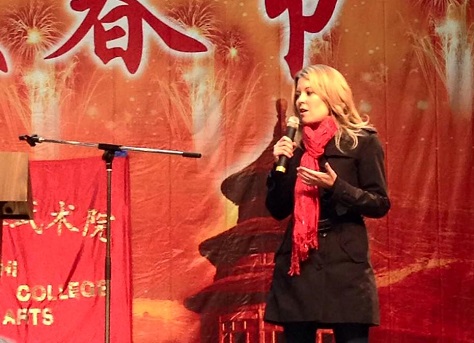
So far, the race to succeed Stephen Harper as the next leader of Canada’s Conservative Party has been notable for the level of disinterest it’s drawn — not a single candidate has yet announced a campaign for the leadership.![]()
Despite wild speculation about who might want to take the reins of Canada’s soon-to-be opposition, some of the most well-known potential contenders have already ruled themselves out of contention — former Québec premier Jean Charest (himself a one-time leader of the old Progressive Conservative Party), former New Brunswick premier Bernard Lord, Saskatchewan’s wildly popular two-term premier Brad Wall, former foreign minister John Baird.
But there’s one potential candidate who isn’t being coy about her intentions.
It’s Michelle Rempel, a 35-year-old MP from Calgary who’s been in office only since 2011. Born in Winnipeg and of partial French Canadian ancestry, she worked in development at the University of Calgary before jumping to politics, winning the by-election when Jim Prentice left federal politics for the private sector (and before Prentice returned to provincial politics for a disastrous run leading Alberta’s government). She quickly made a splash in the House of Commons and in 2013, Harper recognized her talents by appointing her as a junior minister for western economic diversification.
In an odd — and at turns, confident, caustic and compelling — Twitter rant in the middle of the night on October 22, Rempel made the case for her potential leadership, sometimes making the case against casual misogyny in everyday politics that would make Hillary Rodham Clinton proud.
It’s worth reading in full: Continue reading Rempel’s amazing Twitterstorm kicks off Conservative leadership race
As expected, former comic actor Jimmy Morales won Guatemala’s presidential runoff Sunday, besting former first lady Sandra Torres by a margin of more than two-to-one.![]()
Riding a wave of widespread popular discontent with a political elite widely seen as corrupt — including former vice president Roxana Baldetti and former president Otto Pérez Molina, both of whom are in jail pending corruption charges — Morales easily captured the presidency with over 67% of the vote.
*****
RELATED: Polls give Morales a lock on Guatemala’s presidential runoff
*****
That was the easy part.
As a political neophyte, Morales will have a steep learning curve in office, especially if he wants to carry forward the agenda of electoral and political reforms that can could make Guatemala’s government more permanently transparent and accountable.
Though he ran under the banner of a small conservative party founded a few years ago by retired conservative generals, the Frente de Convergencia Nacional (FCN, National Convergence Front), it holds just 11 seats in Guatemala’s unicameral Congreso (Congress). That means that Morales is going to have to build a congressional majority nearly from scratch. The good news is that Guatemala’s political parties are so personality-driven that the collapse of Pérez Molina, Torres and former presidential frontrunner Manuel Baldizón means there will be ample room for legislators to join the Morales bandwagon. The bad news is that many of those legislators are part of Guatemala’s corruption problem, and they have no incentive to enact reforms that will make graft even more difficult and establish roadblocks to the political financing they will need to further their own political careers.
Meanwhile, Morales’s landslide obscures the fact that a lot of Guatemalans — even those who voted for him — are worried about the right-wing flavor of his campaign. Though Morales attracted a broad coalition of voters who are eager to flush the corrupt political elite out of power, there’s far more hesitation about Morales himself.
A socially conservative evangelical, Morales is anti-abortion, anti-LGBT rights and he has the support of much of the military elite, through the FCN and otherwise. He’s argued for the outright annexation of Belize, for example, and he’s otherwise embraced nationalist positions. Other critics point out that many of his skits, over a long career in television, are rooted in racial and ethnic stereotypes, which could breed distrust among indigenous Mayan and other communities that have often been mistreated by Guatemala’s military and democratic governments alike.
After a disappointing fifth-place finish in last year’s presidential election, former Bogotá mayor Enrique Peñalosa has made a staggering political comeback, winning a new term as the mayor of Colombia’s capital 14 years after first serving in the office.![]()
Peñalosa was widely expected to win the race, the most high-profile in a series of local elections across Colombia on October 25, which come at a crucial point in ongoing negotiations between the government of president Juan Manuel Santos and the guerrilla Fuerzas Armadas Revolucionarias de Colombia (FARC, the Revolutionary Armed Forces of Colombia).
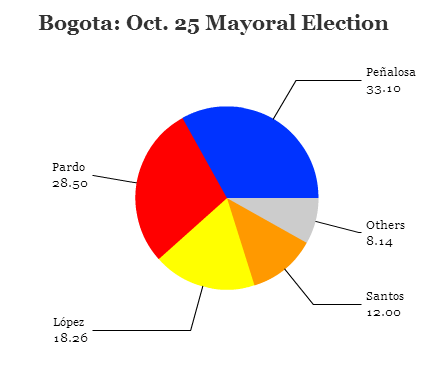
Peñalosa, formerly a member of Colombia’s moderate/liberal Partido Verde (Green Party), ran as an independent campaign in the current Bogotá race, though he did so with the support of a minor center-right party, Cambio Radical (Radical Change). Despite his ties to the Greens, Peñalosa has always been a relatively business-friendly figure in Colombian politics with both economically and socially liberal policy positions. In his first stint as mayor, he introduced TransMilenio, the city’s rapid transit bus system.
Despite his past electoral failures, Peñalosa’s victory gives him access to a position that’s more powerful than any other in Colombia (with the exception of the presidency). He should now be seen a serious potential contender for the Colombian presidency in 2018, when term limits will force Santos to step down after two terms in office. Continue reading After 14 years, Peñalosa returns as mayor of Bogotá
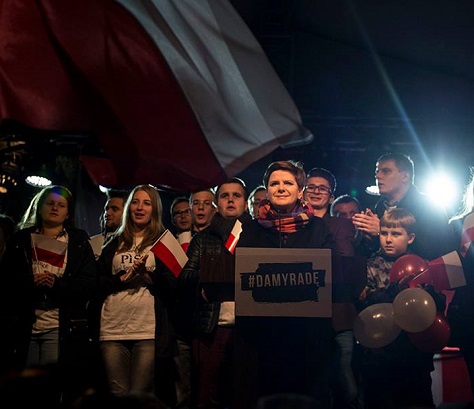
In a sweeping election, the nationalist conservative Prawo i Sprawiedliwość (PiS, Law and Justice) will return to power after eight years in the wilderness, bringing the prickly former prime minister Jarosław Kaczyński back to the heart of Polish and European governance, according to exit polls pending the release of full election results on Monday.![]()
Though Kaczyński himself didn’t stand for prime minister, he hand-picked the PiS’s prime ministerial candidate, 52-year old Beata Szydło, a more moderate figure who worked throughout the campaign to assure voters that the PiS could form a more constructive government than the one Kaczyński led between 2005 and 2007, when his late twin brother Lech Kaczyński simultaneously served as Poland’s president.
The PiS’s presidential candidate, Andrzej Duda, a 42-year-old member of the European parliament, won an upset victory in May’s presidential election. A nationalist who opposes Poland’s entry into the eurozone, Duda (like Szydło) nevertheless portrayed a more moderate quantity than Kaczyński.
Though Kaczyński hasn’t particularly undermined Duda (so far), the presidency is a far more ceremonial office than the premiership, so it’s reasonable to believe that Kaczyński will play a much more hands-on role in the next government, if behind the scenes. That means that most important question that the new government faces is whether it will embrace the more moderate Duda-Szydło approach or revert to Kaczyński’s more pugilistic and confrontational manner. (A close second is the degree to which the next government will embrace economic liberalism, given the PiS’s penchant for populism).
*****
RELATED: Polish conservatives prepare to return to power after 8 years
*****
The election results amount to a repudiation of Donald Tusk, the former Polish prime minister appointed last year as president of the European Council. Tusk hasn’t made the easiest transition from Warsaw to Brussels. Part of the reason is that he has spent so much effort trying to continue to shape Polish politics through his hand-picked successor, Ewa Kopacz, who didn’t share Tusk’s immense charisma or gravitas. His party, the more liberal, center-right Platforma Obywatelska (PO, Civic Platform), had trailed consistently since the May presidential election, despite one of the best economic records in Europe. GDP growth since the 2008-09 financial crisis is the highest in Europe, and the country actually avoided recession throughout the past eight years.
Even with Tusk at the helm, a third consecutive mandate would have been difficult. Voters voiced growing concerns over a wire-tapping scandal and exasperation with the unequal pace of economic development. Civic Platform also faced the general sense of fatigue that comes after two full four-year terms in office. Moreover, fears over border security and the European refugee crisis this autumn also played to the PiS’s more nationalist strengths.
Headlines and commentary suggest that the new Polish government will look like Viktor Orbán’s hard-right, nationalist government in Hungary, but that somewhat overstates the case. Though the PiS will echo Orbán’s line on migration and border security (essentially the same position as Slovakian prime minister Robert Fico), Orbán has expressly taunted European values and embraced the concept of an ‘iliberal’ Hungary. No one expects Poland to follow suit.
Nevertheless, the new government will be even more hawkish in pushing for European (and NATO) vigilance against Russia, and the PiS will push for Poland to take a leading role throughout eastern and central Europe on all matters, including security.
Relations with the rest of the European Union will not come quite as easily as under the Tusk-Kopacz governments, though. The PiS government will join both Orbán and British prime minister David Cameron with a far more nationalistic view toward EU reform to restore more powers to member states, especially as EU officials struggle with border security. As Cameron gears up for EU negotiations for greater British opt-outs prior to the 2017 referendum on UK membership in the European Union, Poland’s new government will provide him with a powerful eastern ally.
Continue reading Poland election results: PiS sweeps to victory
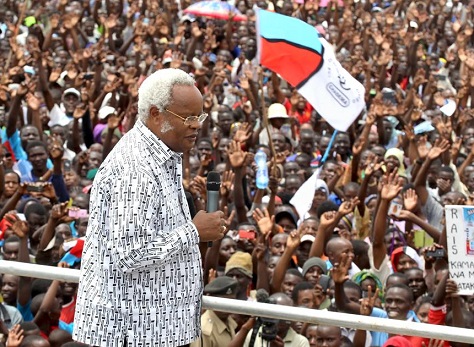
It’s not every day that hopes for reform and good government lie more with reelecting the dominant party that’s held power since 1977 than with opting for the opposition.![]()
But increasingly, that seems to be the case in Tanzania, where the October 25 general election pits John Magufuli, the standard-bearer of the ruling Chama Cha Mapinduzi (CCM, Party of the Revolution) against Edward Lowassa, one of the CCM’s former presidential hopefuls and a disgraced former prime minister. Lowassa is running as the candidate of the Ukawa opposition front that includes Chama Cha Demokrasia na Maendeleo (popularly known simply as Chadema), a liberal opposition party formed in 1992, and Chama Cha Wananchi (CUF, Civic United Front), the Zanzibar-based opposition party.
Changing places?
Though Lowassa is the wilier politician, the CCM is still favored to hold onto power after Sunday’s elections. Since multi-party politics were introduced in 1992, the CCM has had little trouble maintaining its lock on the Tanzanian government. On the mainland, at least, the CCM (and before 1977, its predecessor, the Tanganyika African National Union) has been virtually interchangeable with government.
But Lowassa’s popularity as a former CCM official, the desire for change among the country’s powerful youth, and growing opposition strength in Zanzibar have made this year’s elections particularly unpredictable.
The current contest between Lowassa and Magufuli has its roots in the tussle earlier this year to determine the CCM’s successor. Jakaya Kikwete, Tanzania’s fourth post-independence president, is term-limited and, while he’ll continue to lead the CCM until 2018, he will leave the presidency after a decade in office, generally maintaining Tanzania’s stable path to greater development. Continue reading Genuinely competitive election boosts Tanzanian democracy

He is in many ways an accidental man of the moment, the man standing on stage who can most credibly claim, as his slogan goes, that he is ni corrupto ni ladrón — ‘neither corrupt nor a thief.’![]()
Jimmy Morales, the 46-year-old former comedian, who just a few years ago graced shampoo bottles across Guatemala in an afro wig and blackface, is now the overwhelming favorite to win the country’s presidential runoff on Sunday, October 25, with one recent poll for the Prensa Libre giving him 67.9% of the vote to just 32.1% for the former first lady, center-left Sandra Torres. Other polls show similar gaps in Morales’s favor.
*****
RELATED: Torres edges Baldizón into Guatemalan runoff with Morales
RELATED: The contour of Guatemala’s new Congress is very conservative
*****
Barring a complete change of heart, Morales will become Guatemala’s next president.
So who is he and what does he believe? How did a comic actor wind up leading Central America’s largest economy? Most importantly, what will his election mean for Guatemala’s future? Continue reading Polls give Morales a lock on Guatemala’s presidential runoff

Next week, for the first time since 2002, Stephen Harper will neither be Canada’s prime minister nor opposition leader. ![]()
At the same time that Stephen Harper was on stage conceding defeat to Liberal leader Justin Trudeau, he announced (via a statement) that he would indeed be stepping down as leader of the Conservative Party, a position that he has held since 2003 when the party first came into being.
In the days ahead, the Conservative Party will decide how to appoint a caretaker interim leader pending a full leadership election to choose the party’s second leader.
Harper leaves behind a mixed legacy, like any prime minister.
For Canada’s conservatives, Harper wasn’t just a three-term prime minister, though his nine-year tenure will be longer than all but five prime ministers in Canadian history. He’s the tribune who led the Canadian right out of the wilderness of opposition and the man who brought the Canadian west back into the national conversation that had focused too long on Toronto commercial matters, constitutional crises, bilingualism and appeasing the Quebeckers.
In retrospect, it’s amazing that it took just three years for Harper to take power after engineering the December 2003 merger between his Canadian Alliance, the upstart prairie and western movement that brought a more full-throated, US-style, socially conservative attitude to national politics, and the more troubled Progressive Conservative Party. By the 2000s, the PCs were a relic of the eastern elite, and the party never fully recovered from the 1993 election, when it lost all but two seats in the House of Commons.
Incredibly, as the Conservative Party looks to choose Harper’s successor in the weeks and months ahead, he is the only leader that the current Conservative Party has known — not counting, of course, the two living former Tory prime ministers Joe Clark and Brian Mulroney, neither of whom ever completely warmed to the Calgarian warrior from the west.
*****
RELATED: Live-blogging Canada’s election results
*****
At just 56 years old, Harper certainly didn’t look or act like a leader (or prime minister) in a hurry for retirement. He looked mostly like someone who believed, until too late, that leftist and moderate voters would split between the Liberals and the New Democratic Party (NDP), giving the Conservatives yet another path to government by plurality vote. To his misfortune (and to the NDP’s), that didn’t happen.
Post-election reports reveal that Harper was considering a pledge not to seek a fifth term after 2015. But having only won his first majority government in 2011, Harper might have easily stuck around to run for a fifth mandate if he’d survived October 19. But in shooting for a fourth consecutive term, Harper knew well that he was facing long odds attempting to repeat what only Conservative John Macdonald and Liberal Wilfrid Laurier accomplished before.
Coupled with the onset of a mild economic recession, it was always an uphill fight for Harper. He can walk away from the election result with his head held high, having remade Canadian conservatism and nudged Canada toward greater fiscal responsibility, more enthusiasm for free trade and presided over a generally more unified Canadian entity. Continue reading Harper’s legacy is the birth of a modern 21st century Canadian conservatism
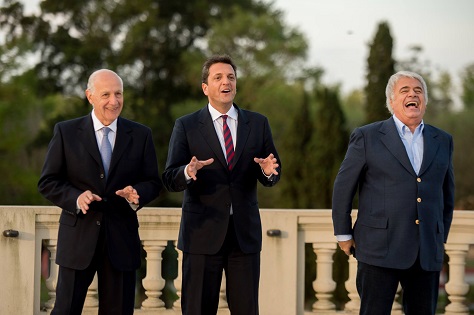
A surprisingly tighter race than expected for Argentina’s presidency is making it more likely that frontrunner Daniel Scioli will win outright in the first round on Sunday, October 25.![]()
Back in August, Scioli, the outgoing governor of Buenos Aires province and the presidential nominee of outgoing president Cristina Fernández de Kirchner and the governing Frente para la Victoria (FpV, the Front for Victory), demonstrated his strength by winning around 38.5% of the vote in Argentina’s somewhat unique ‘open primary’ contest.
His nearest contender was Mauricio Macri, the more conservative and economically liberal outgoing mayor of Buenos Aires, who is leading a broad center-right coalition called Cambiemos (which loosely translates as “Let’s change”), which won about 30% of the vote (including the other challengers who competed with Macri for the coalition’s presidential nomination).
Far back in third place was Sergio Massa, one of Kircher’s first cabinet chiefs, now the mayor of Tigre and the leader of an alternative peronista group, the Frente Renovador (FR, Renewal Front), which won just 20.5% of the vote.
* * * * *
RELATED: Kirchner 2019 comeback could
complicate Scioli presidential bid
RELATED: Scioli leads in Argentine presidential race after primaries
* * * * *
A one-time frontrunner after leading his new group to the top result in Buenos Aires province during the 2013 midterm elections, Massa’s appeal seems to have stalled through 2014 and earlier in 2015. His electoral alliance choices turned out to be weaker than expected, and he lacks the voter base that both Scioli (as leader of Argentina’s most populous province) and Macri (as leader of Argentina’s capital city) can boast. Moreover, as Kirchner’s approval ratings improved over the course of 2015, so did Scioli’s standing, as he won back disaffected peronistas who might otherwise be tempted to join Massa’s alternative group.
Since August, Scioli continues to lead the pack, while the movement in the race has come in the battle for second place — most polls are now showing that Macri is losing votes and that Massa is gaining. There are many potential reasons.
Explaining the Massa popularity surge
It could be that Argentines feel that Macri is still too close, ideologically speaking, to the economic neoliberalism of the 1990s that many voters feel was responsible for destroying the economy in 1999-2001.
It could be that Macri has been tarred by association with Fernando Niembro, a businessman who had been one of the coalition’s leading congressional candidates from Buenos Aires until suspending his campaign in September following an indictment on money laundering charges. That connection has made it hard to argue that Macri will make doing business in Argentina more efficient, transparent or graft-free.
It could be that Macri has done so much to signal that he will not introduce radical change that voters are doubting his authenticity, ability or resolve. He’s already pledged not to re-privatize the Argentine state oil company, YPF, or the airline company Aerolíneas Argentinas. If there’s one thing that Macri is not, it’s a peronista. But he has spent much of the post-primary period embracing peronismo. Earlier this month, Macri even unveiled a new statue of Juan Perón in the capital, awkwardly arguing that he shared the values of peronismo:
“I am not a Peronist but I have social justice in my heart,” Macri said as he unveiled the statue of Peron last week. “I want to invite all Peronists to work with us to create the Argentina we all dream about.”
But Massa’s improvements could also come from a belief that Massa represents a better chance for gradual ‘change,’ with a better shot of defeating Scioli if the race continues to a runoff on November 22. There are still real doubts about Scioli’s ability to run an independent administration with so many Kirchner loyalists in key positions, including the vice presidency. Continue reading Tactical voting considerations cloud outcome of Argentine presidential election
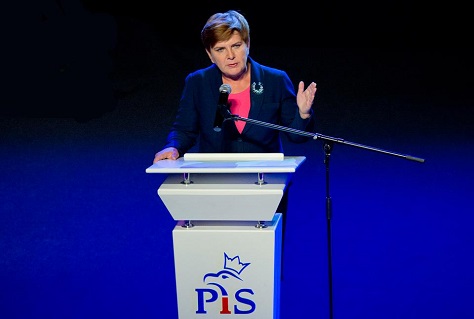
On Sunday, voters in Poland, the pivotal country of eastern and central Europe, will almost certainly vote to eject the governing, center-right Platforma Obywatelska (PO, Civic Platform), handing an embarrassing defeat to Donald Tusk, the former prime minister who left Polish politics last year to become the president of the European Council.![]()
With the conservative, nationalist Prawo i Sprawiedliwość (PiS, Law and Justice) set to return to power after eight years, Poland’s rightward move could undermine Tusk’s European role. More importantly, for a country of nearly 39 million people and a rising economic powerhouse in the European Union (with the rising clout to match), it could shift European policy to the right on refugee policy. Ever skeptical of Russia, a new conservative government would also agitate for greater European, US and NATO activism to counter Russian president Vladimir Putin in Ukraine and elsewhere.
May’s presidential vote: prelude to a electoral meltdown
In retrospect, the outcome of the October 25 parliamentary elections seems to have been settled five months ago when Polish voters narrowly ousted incumbent president Bronisław Komorowski in favor of 43-year-old Andrzej Duda, a conservative novice in Polish politics and little-known member of the European Parliament.
Former prime minister Jarosław Kaczyński, a controversial figure on the Polish right, determined earlier this year that he would not seek a rematch against Komorowski, who defeated Kaczyński in 2010 after a tragic airplane crash killed the incumbent, his twin brother Lech Kaczyński, along with dozens of other top Polish officials over Russian airspace. Kaczyński instead, handpicked Duda from relative obscurity to carry the presidential banner.
Komorowski, technically an independent, nevertheless boasted the support of the governing Civic Platform and, until the very end, seemed likely to win reelection. But his wooden style and a lack of engagement did him no favors in a campaign where anti-establishment rage was on the rise. For example, rock singer Paweł Kukiz attracted nearly 21% of the vote as a protest candidate, running an acerbic and populist campaign that won Poland’s youth vote in the first round of the presidential election.
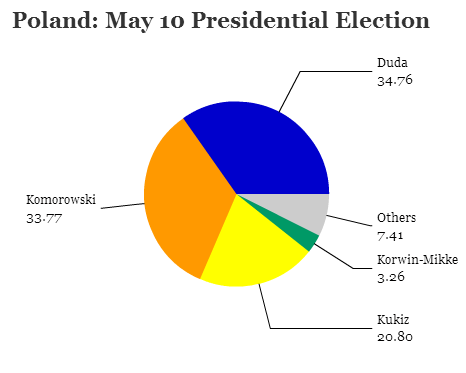
Komorowski fell narrowly behind on May 10 in the race’s first round, and he lost the May 24 runoff to Duda by a margin of 51.55% to 48.55%.
A kinder, gentler Law and Justice Party?
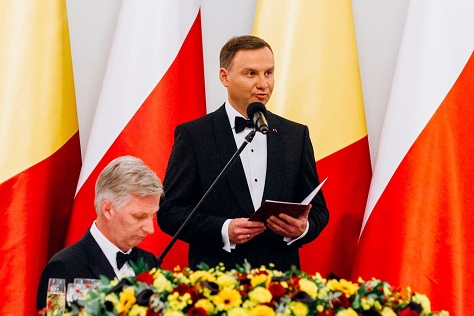
Duda’s outsider status matched a growing sense that Poland’s strong economic performance hasn’t necessarily filtered through to the entire population, especially in Poland’s east, where traditionally conservative voters have missed the boom that’s developed in the country’s west and in urban centers like Warsaw. Moreover, Duda campaigned hard against Poland’s future accession as a eurozone member. Though Poland is notable for achieving the highest growth rate in the European Union since the 2010-11 eurozone sovereign debt crisis — GDP growth peaked at 4.8% in 2011 and achieved an impressive (by European standards) 3.3% growth rate last year — voters are nevertheless in a mood for change.
Kaczyński quickly learned the lesson of Duda’s success, and his party is running the same strategy for the October parliamentary elections. Instead of personally leading the party’s efforts for the parliamentary elections, Kaczyński turned the campaign over to another newcomer, Beata Szydło, a PiS deputy since 2005, the year that the PiS first took power (in a short-lived, two-year government that Jarosław Kaczyński led as prime minister while his brother held the presidency).
At a June party convention, Kaczyński quickly passed the political baton to Szydło, and Law and Justice held a lead in the parliamentary contest ever since. Like Duda, Szydło has taken a softer center-right tone throughout the campaign, avoiding the controversial topics that might otherwise have dogged Kaczyński.
Barring a complete meltdown, it’s nearly certain that Law and Justice will push Civic Platform out of power for the first time in eight years. The latest IBRiS poll, dated October 19, gives Law and Justice 36% of the vote to just 22% for Civic Platform, followed by the Polish left’s electoral coalition with just 11%.
Economic angst and refugee crisis impede Civic Platform’s reelection
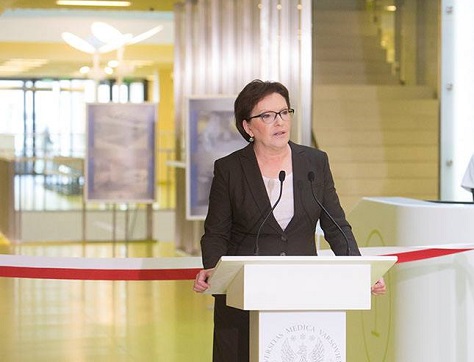
Such a damning defeat will leave Tusk somewhat isolated as European Council president and, potentially, in the awkward position of working against Poland’s soon-to-be government, notwithstanding the fact that Tusk’s election was something of an honor for Poland. Befitting the country’s centrality among the set of central and eastern European states that joined the European Union in 2004, Tusk is the first eastern European to hold one of the top EU offices of state.
Tusk left his government in the hands of Ewa Kopacz, a Tusk loyalist, former health minister and former marshal of the Sejm (akin to a parliamentary speaker), who has struggled in the last 13 months in an increasingly Sisyphean attempt to lead Civic Platform to its third consecutive victory. That may have less to do with the amiable Kopacz than a sense of restlessness over eight years of government by a party viewed increasingly as elitist and out of touch. Nagging scandals have emerged in the past two years, the most damaging of which involved the release of secret recordings of former foreign minister Radek Sikorski, former finance minister Jacek Rostowski and others making crude comments, including about the bilateral relationship with the United States, in Sikorski’s case.
As Law and Justice attacks the fits and starts of a Polish economy that still has some wrinkles to work out, Kopacz has been left promising, with little credibility, that young Polish workers can fare just as well at home as in western Europe. Despite growth, Polish nGDP per capita is just around $13,000, far below wealthier countries like Germany and France.
In addition, since the May presidential election, the European migrant crisis is now boosting the Polish right, as the number of refugees across the continent surges to numbers unseen since World War II. In the leaders’ debate on Tuesday evening, Szydło boldly attacked EU refugee policy and argued that ‘Poles have the right to be afraid’ of the unknown consequences of accepting so many refugees. Kopacz, for her part, argued that her government successfully negotiated down the number of refugees that the European Commission’s original quota plan entailed.
Whither Kaczyński?
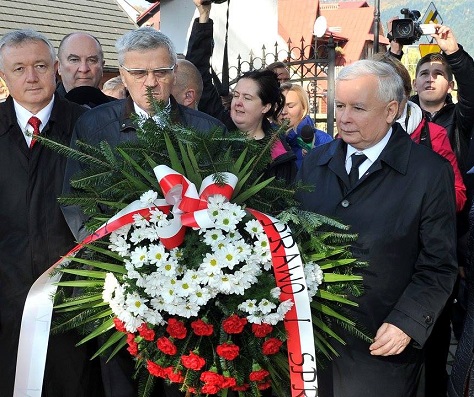
The former mayor of Brzeszcze, Szydło is virtually unknown outside of Poland (and perhaps even inside Poland until her elevation earlier this summer), which is somewhat staggering for someone who is set to become the leader of the European Union’s sixth-most populous member:
An ethnography graduate and mother to two sons, the erstwhile PiS backbencher was only recently as unknown as Duda. But she has a reputation for being well-adjusted, hard-working and resilient. But also a little dull…. She doesn’t have to pretend to be down-to-earth — she just is.
Though Kaczyński himself formally nominated Szydło as the Law and Justice prime ministerial candidate, the party founder will surely play an important behind-the-scenes role if the PiS returns to power. So the largest question mark hanging over the coming PiS government is just how much it will be Szydło’s government and not just Kaczyński’s government. Last week, for example, Kaczyński made headlines by suggesting that migrants are bringing ‘all sorts of parasites and protozoa’ to Europe.
For all of Kaczyński’s odd statements, he may turn out to be more distraction than puppetmaster. Duda, for example, has taken a much friendlier line towards Germany than Kaczyński might have liked, and Szydło would be wise to follow Duda in avoiding the confrontational approach with European leaders that Kaczyński deployed a decade ago. Nevertheless, Poland will certainly continue to take a hawkish line against Russia, pushing for greater EU and NATO engagement over Ukraine and the former Soviet Union.
Poland’s voters will elect all 460 deputies of the Sejm, the lower house of the Polish parliament, and all 100 senators of the upper house, the Senat. The deputies are elected by proportional representation in multi-member constituencies that contain between 7 and 19 representatives, subject in each case to a 5% national threshold. (Senators are elected on a first-past-the-post basis).
For a decade, Polish politics has been a contest between two visions of the ‘right’ — Tusk’s liberal, business-friendly and pro-European variant and Kaczyński’s socially conservative, religious, populist and eurosceptic version. That will remain the case on Sunday, though there are a handful of other parties vying for seats, a handful of which are new to the political scene.
The traditional party of the Polish left, the Democratic Left Alliance, joined forces with four other smaller leftist, centrist and green parties to form the Zjednoczona Lewica (ZL, United Left), under the leadership of Barbara Nowacka. The parties together won 18.8% of the vote in the 2011 election, but polls suggest it will be lucky to win barely 10% in 2015. Though the party boldly advocates taking in as many Syrian and other refugees as possible, the Polish left has long been out of sync with the electorate.
Kukiz, whose own anti-establishment movement took the presidential campaign by storm, seems to have stalled, with support for his ‘Kukiz ’15’ movement fizzling gradually since May, though the group may still win some seats in the Sejm.
The longstanding Polskie Stronnictwo Ludowe (Polish People’s Party), a traditional Christian democratic party, and the more libertarian, anti-immigration and anti-European ‘KORWIN’ coalition of the hard-right MEP Janusz Korwin-Mikke could also enter the Sejm. Nowoczesna (Modern), a liberal party formed in May by economist Ryszard Petru, is also hoping to cross the 5% threshold.
If all three parties make it — and if Law and Justice fails to win a 231-seat majority, a distinct possibility — Szydło might be forced to include one of them as a partner in a governing coalition.
Defying expectations in August that pitted the Liberal Party in third place at the beginning of the election campaign in August, Justin Trudeau has now won a clear majority government and a mandate for change in Canada’s 42nd federal election.![]()
So what does that mean for Canada, for US-Canadian relations and for Canada’s role in the world in the weeks and months ahead?
Here are nine policy areas to keep an eye on as Trudeau begins the rapid transition to 24 Sussex Drive, appoints a cabinet and tackles a full agenda of issues that could dominate what will likely be a full four-year term with the kind of parliamentary mandate that should make it much more easier than Trudeau ever expected to enact his policy preferences.
Climate change. As the Paris summit on climate change approaches in November, Canada’s government will go from being one of the most skeptical participants at the conference to one of the most enthusiastic supporters of action to reduce carbon emissions. Keep an eye on Stéphane Dion, the former Liberal leader from 2006 and 2008 and a former environmental minister, to play a vocal and supportive role. Nevertheless, global climate change policy is mostly set by the G-2 — i.e., the United States and China. So Trudeau’s role at the summit, while productive, will be more about style than any actual substance. Joyce Murray, a popular left-wing MP and British Columbia’s former environmental minister, who was the runner-up to Trudeau in the 2013 Liberal contest, is also a rising star to watch on environmental matters.
Economic policy. At the start of the campaign, the traditionally more centrist Liberals advanced a tax policy to the left of the New Democratic Party (NDP) by promising a middle-class tax cut to be paid for by slightly higher taxes on those who earn roughly more $200,000 annually. During the campaign, as Canada officially slipped into a shallow recession, Trudeau doubled-down by pledging to engage in deficit spending over the next three years to stabilize Canada’s economy, protect jobs and boost infrastructure. It was this move, again outflanking the NDP (whose leader Thomas Mulcair promised to maintain the Conservative Party’s devotion to balanced budgets), that may have convinced voters that Trudeau, and not Mulcair, represented the most striking contrast with Conservative prime minister Stephen Harper.
Ralph Goodale, a former finance minister under Paul Martin; Bill Morneau, a 52-year-old newcomer first elected last night from the Toronto’s business world and Scott Brison, a former Progressive Conservative MP who defected to the Liberals over a decade ago, could all be leading contenders for finance minister. Continue reading Nine things to watch as Canada’s next Trudeau era begins